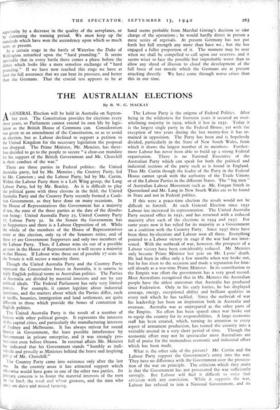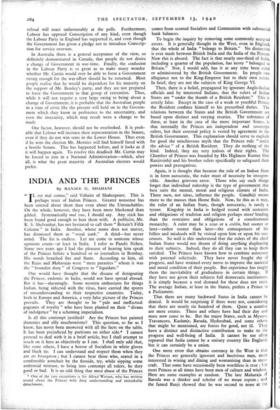THE AUSTRALIAN ELECTIONS
By It. W. G. MACKAY
A GENERAL Election will be held in Australia on Septem- ber 21st. The Constitution provides for elections every three years, so Parliament cannot extend its own life by legis- lation as the British House of Commons can. Consideration was given to an amendment of the Constitution, so as to avoid an election, but as Labour declined to support a petition to the United Kingdom for the necessary legislation the proposal was dropped. The Prime Minister, Mr. Menzies, has there- fore decided to go to the people to secure " a clear-cut mandate for his support of the British Government and Mr. Churchill in their conduct of the war."
There are three parties in Federal politics: the United Australia party, led by Mr. Menzies ; the Country Party, led by Mr. Cameron ; and the Labour Party, led by Mr. Curtin. Within the Labour Party there is a Left Wing group, the Lang Labour Party, led by Mr. Beasley. As it is difficult to play the political game with three elevens in the field, the United Australia Party and the Country Party recently formed a Coali- tion Government, as they have done on many occasions. In the House of Representatives this Government has a majority of ten, the state of the three parties at the date of the dissolu- tion being : United Australia Party 25, United Country Party :7, Labour Party 32. In the Senate the Government has 20 Supporters and there is a Labour Opposition of 16. While the whole of the members of the House of Representatives retire at this election, only 19 of the Senators retire, and of these 17 are Government Supporters and only two members of the Labour Party. Thus, if Labour wins six out of a possible 42 seats in the House of Representatives it will secure a majority in that House. If Labour wins three out of possible 17 seats in the Senate it will secure a majority there.
Though the United Australia Party and the Country Party represent the Conservative forces in Australia, it is unwise to apply English political terms to Australian politics. The Parties in Australia are divided by material interests and not by any political ideals. The Federal Parliament has only very limited powers. For example, it cannot legislate about industrial questions, and the matters about which the Parties differ, such as tariffs, bounties, immigration and land settlement, are quite different to those which provide the bones of contention in English politics.
The United Australia Party is the result of a number of fusions with other political groups. It represents the interests of the capital cities, and particularly the manufacturing interests of Sydney and Melbourne. It has always striven for sound finance in Government, the least possible interference by Government in private enterprise, and it was strongly pro- tectionist even before Ottawa. In external affairs Mr. Menzies has indicated that his Government stands " humbly as indi- viduals and proudly as Ministers behind the brave and inspiring Poky of Mr. Churchill."
The Country Party came into existence only after the last War. In the country areas it has attracted support which otherwise would have gone to one of the other two parties. Its Primary concern is to foster the material interests of the men an the land, the wool and wheat growers, and the men who carry on dairy and mixed farming. The Labour Party is the enigma of Federal Politics. After being in the wilderness for fourteen years it secured an over- whelming majority in 1929, which it lost in 1931. Today it is the largest single party in the Federal House, yet with the exception of two years during the last twenty-five it has re- mained in opposition. The Party has been and is hopelessly divided, particularly in the State of New South Wales, from which it draws the largest number of its members. Further- more Labour has never been able to build up a strong Federal organisation. There is no National Executive of the Australian Party which can speak for both the political and industrial sections of the party such as is found in England. Thus Mr. Curtin though the leader of the Party in the Federal House cannot speak with the authority of the Trade Unions or of the Labour Parties in the different States. The " big men " of Australian Labour Movement such as Mr. Forgan Smith in Queensland and Mr. Lang in New South Wales are to be found in State and not in Federal politics.
If this were a peace-time election the result would not be difficult to foretell. At each General Election since 1931 Labour has increased its representation. The United Australia Party secured office in 1931, and has returned with a reduced majority after each of the elections in 1934 and 1937. For some years now it has relied for its majority as a Government on a coalition with the Country Party. Since 1937 there have been three by-elections and Labour won all three. Everything pointed to a Labour victory in 1940 if the war had not inter- vened. With the outbreak of war, however, the prospects of a Labour victory have been considerably reduced. Mr. Menzies only became Prime Minister last year on Mr. Lyons' death. He had been in office only a few months when war broke out, but he has risen to the occasion and made a reputation for him- self already as a war-time Prime Minister. In its contribution to the Empire war effort the government has a very good record. Most Australians recognised that in Mr. Menzies the Australian people have the ablest statesman that Australia has produced since Federation. Only in his early forties, he has displayed courage, energy, exceptional ability and brilliant qualities in every task which he has tackled. Since the outbreak of war his leadership has been an inspiration both in Australia and overseas. Australia was as unprepared as the other parts of the Empire. No effort has been spared since war broke out to equip the country for its responsibilities. A large economic staff has been created, which, turning its attention to every aspect of armament production, has turned the country into a veritable arsenal in a very short period of time. Though the economic effort may not be spectacular most Australians are full of praise for the tremendous economic and industrial effort which has been made.
What is the other side of the picture? Mr. Curtin and the Labour Party support the Government's entry into the war. They have no difference with the Government over the prosecu- tion of the war on principle. The criticism which they make is that the Government has not prosecuted the war sufficiently strongly. But Labour will find it difficult to voice that criticism with any conviction. While it supports the war, Labour has refused to join a National Government, and its refusal will react unfavourably at the polls. Furthermore, Labour has opposed Conscription of any kind, even though the Labour Party in England has supported it, and even though the Government has given a pledge not to introduce Conscrip- tion for service overseas.
In Australia there is a general acceptance of the view, so definitely demonstrated in Canada, that people do not desire a change of Government in war-time. Finally, the confusion in the Labour Party is so great as to make many wonder whether Mr. Curtin would ever be able to form a Government strong enough for the war-effort should he be returned. Most people realise that he would be dependent for his majority on the support of Mr. Beasley's party, and they are not prepared to leave the Government to that group of extremists. Thus, while it will not require a very large swing to bring about a change of Government, it is probable that the Australian people in a time of crisis like the present will hold on to the Govern- ment which they know in preference to the uncertainty, and even the insecurity, which may result were a change to be made.
One factor, however, should not be overlooked. It is prob- able that Labour will increase their representation in the Senate, even if they do not win seats in the Lower House. Thus even if he wins the election Mr. Menzies will find himself faced with a hostile Senate. This has happened before, and it looks as if it will happen again. To resolve this deadlock Mr. Curtin may be forced to join in a National Administration—which, after all, is what the great majority of Australian electors would prefer.



























 Previous page
Previous page